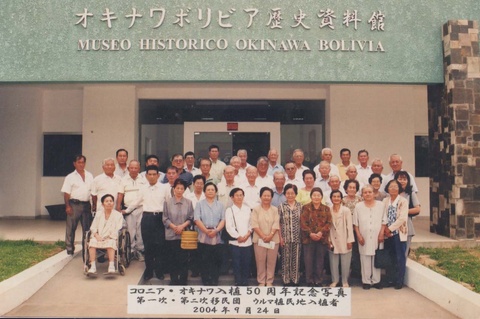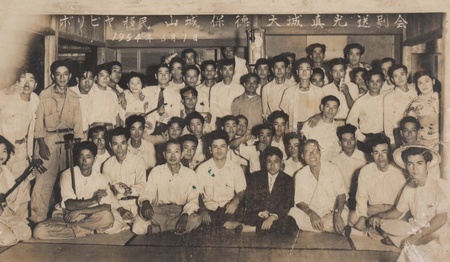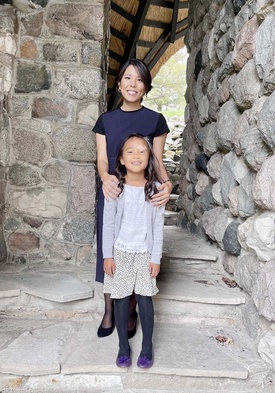
Both parents grew up in Colonia Okinawa, Bolivia.
I first met Eriko Higa, an immigration lawyer based in Los Angeles, when I interviewed her for a newsletter for a Japanese business association. "When my father moved to the US for his job, the visa procedures did not go smoothly, and I had a lot of trouble, so I'm using that experience in my current job," said lawyer Eriko Higa. She also told me, "My grandparents were Bolivian immigrants from Okinawa, and my parents were born in Bolivia."
Higa-san was born in Tochigi Prefecture, where his father, who had been working in Japan from Bolivia, was working, and returned to Bolivia with his parents, sister and brother when he was in elementary school. He spent his time there until halfway through high school, but when his father, who had been working for the company in Japan, was stationed in the US, the Higa-san family moved to Detroit, Michigan after waiting for the issuance of a visa in Japan.
I learned that "Colonia Okinawa," which I had heard about from people of Okinawan descent, was the place where Higa's grandparents eventually settled, and I became interested in Higa's own identity, having grown up in both Japan and Bolivia. I had the opportunity to hear her story again, including about her family's immigration history.
"My maternal grandparents, Yamashiro Yasunori and Kuniko, were the first to emigrate to Bolivia in the 1950s. After World War II, Okinawa came under U.S. rule, which led to a land shortage and a growing trend toward overseas emigration. However, the land my grandfather first moved to to work in agriculture was in the middle of virgin forest, plagued by flooding and unsuitable for farming, so he moved to another location. However, there were many problems there as well, and he eventually settled in Colonia Okinawa, where there was a large Japanese population. There, my grandfather started one business after another, including livestock farming and cotton cultivation, but he repeatedly failed, but he eventually succeeded.
In Okinawa, my grandmother was a school teacher and was busy taking care of five children. My paternal family came to Bolivia after my maternal family did. My mother and father met as classmates at elementary school in Colonia Okinawa. There was an elementary school in Colonia Okinawa, but after graduating, all the children went to junior high school in the nearest town, Santa Cruz, and lived in the dormitory.

The words and responses change depending on the person
Santa Cruz was also where Higa lived from the second grade of elementary school until he was 16 years old. "It's about an hour's drive from Santa Cruz to Colonia Okinawa. In addition to his work at the company, my father owned land there and worked in livestock farming, so our family often visited Colonia Okinawa where my grandparents lived." However, when Higa was 16 years old, his mother passed away. At that point, it was decided that he would accompany his father to the United States, and after waiting for his visa to be issued in Japan as mentioned above, he began his life in the United States in his final year of high school.
For Higa, who has a Japanese and Bolivian background, there was a lot to learn from the diverse country of America. However, after losing her mother, she was so busy looking after her younger sisters that she didn't have the time to stop and think deeply about whether America was a good fit for her.
After that, Higa majored in international relations at university and went on to the University of Michigan Law School to become a lawyer. So what country does he consider himself to be now?
"Because my parents are Bolivian of Japanese descent, even when I was growing up in Japan I felt a little different from Japanese people born in Japan. My mother was a very volunteer-minded person and would wear traditional Bolivian costume and introduce Bolivia to my elementary school, so I think I always had a sense of being Bolivian of Japanese descent. After that, I lived a normal life in Bolivia, but to be honest, even if I tried to visit Bolivia again now, I'm not very enthusiastic about it, as I'm worried about the safety of bringing a child born in the United States and I'm afraid of the water. But one day I would like to show my daughter Bolivia, the country where my ancestors built the foundations for today, and let her meet my grandmother and other relatives who still live there."
Nevertheless, Higa, who can speak Japanese, Spanish, and English, says that when speaking with Americans or Japanese people at work, he can instantly switch not only the language he uses but also his responses depending on the person he is speaking with.
His grandparents' immigrant experience has inspired him
After living in Japan and Bolivia, Higa came to the diverse country of America nearly 20 years ago, where she got married and became a mother.

"My husband is Korean, born in Venezuela and raised in Germany. At home, we have seaweed soup on birthdays (like Koreans do), and on New Year's we serve Japanese osechi dishes, so our children have the opportunity to be exposed to Korean, Japanese, and American culture. My husband and I both work, so we only see each other in the evenings. We spend most of our time as a family in English, and unfortunately we haven't been able to actively teach them other languages, so our daughter can only speak a little Korean and Japanese, but I try to give my husband and I as many opportunities as possible to be exposed to the cultures of our respective ancestors."
Higa says that she may live in Japan for a short time in the future, but ultimately she thinks the United States will be the best place to live. Her grandparents, who immigrated to Bolivia, continued to live in Colonia Okinawa until the end, even as the people around them returned to Japan. When asked why she thought they chose the place they immigrated to as their final home, she replied:
"Why? It seems that the topic of repatriation was never mentioned. One possible reason why my grandparents stayed behind is that my grandfather was an extremely optimistic person. He wasn't struggling to make ends meet or find work when he left Okinawa; in fact, he was in a very fortunate situation, but he still attempted to emigrate. Moreover, even after his business failed repeatedly in Bolivia, he never lost his spirit of challenge.
My grandfather would humorously tell stories of the racism he encountered on a day trip to South Africa under apartheid when he crossed from Japan to Bolivia, the time when he rode on horseback to pick up the midwife who had immigrated with him when my aunt was born, while the entire village was submerged in water, and the terrible failure he experienced in cotton cultivation. The fact that my grandparents overcame great hardships as immigrants gives me great strength, as I believe that I too can overcome obstacles, just as they turned their stories of hardship into laughs."
© 2023 Keiko Fukuda





